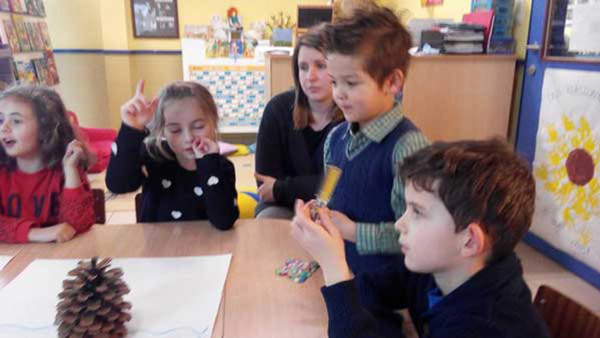Problem-Based Learning
The Problem-Based Learning (PBL) methodology for early childhood education was developed by the Folkuniversitetet. Educators from six EU countries were trained at Folkuniversitetet Uppsala and tested the methodology. Today the method expands in Russia and Ukraine.

21st century skills
As today's fast-paced world quickly evolves, it has become increasingly evident that children must develop a set of skills they can (and will need to) call upon in college and work.
These 21st century skills that are in a high demand in our modern life include: goal-setting, team work, critical thinking, planning, problem solving, creativity, innovation, leadership, media literacy, visioning, cross-cultural understanding, computing and ICT skills.
Technology is changing how we do things, which plays a tremendous role in the world of work. New careers are created, industries are born, and old job roles become obsolete. That’s why, we need to be able to adapt quickly to new changes.
Problem-Based Learning
The key to acquisition of the new skills and employing technological innovations is Problem-Based Learning (PBL).
A number of trends have contributed to the adoption of project-based learning as a 21st-century strategy for education. Culture, context, and the social nature of learning all have a role in shaping the learner's experience. These insights help to explain the appeal of PBL for engaging diverse learners.
Education today is changing from one of factual-based to one of inquiry-based. This new approach to learning is bringing about new ways in which students are involved in the learning process. Teachers know that students do not learn at their highest potential when they are in a classroom where the teacher stands at the front of the room and gives them knowledge. Students learn best when they are engaged in the learning process and discover for themselves the meaning of knowledge. Project-Based Learning in the student centered classroom gives students the chance to discover knowledge in a meaningful and applicable way.
PBL helps improve the quality of learning by developing students’ reflective, critical and collaborative skills. PBL refers to students designing, planning, and carrying out an extended project that produces a publicly-exhibited output such as a product, publication, or presentation. It is related to inquiry-based learning.
Read more
The PBL methodology for early childhood education
The Problem-Based Learning (PBL) methodology for early childhood education was developed by the Folkuniversitetet within the "Early Learn to Learn Environment" project (2014-1-TR01-KA201-013169), funded by the European Commission under the Erasmus + program.
Folkuniversitetet was a methodological partner in the project, which proposed use of PBL in kindergartens, and subsequently developed the corresponding methodology for it.
Partners of "Early Learn to Learn Environment" project after the training at Folkuniversitetet
Within the scope of the project, 20 educators from six EU countries were trained at Folkuniversitetet Uppsala, who further tested the methodology at their institutions. Upon completion of the project, the methodology was supplemented and further developed by Folkuniversitetet. The core focus of the developed method lies in developing 21st century skills such as critical thinking, problem-solving and teamwork among children.
The method for kindergartens
Problem Based Learning is a systematic teaching method that engages students in learning important knowledge and 21st century skills through an extended, student-influenced inquiry process structured around complex, authentic questions and carefully designed products and learning tasks.
Problem Based Learning allows teachers to create tasks whose complexity and openness mimic problems in the real world. Children can see the interdisciplinary nature of these tasks, and see that each task may have more than one solution. Children who have the freedom to choose different strategies and approaches may become more engaged in the learning process, and these children will be more likely to approach other problems with an open mind.
A PBL exercise can be:
- An exploration of a question, such as "What is a healthy food?"
- An investigation of a natural phenomenon
- A problem-solving situation, either real or in a fictitious scenario
- An in-depth examination of a controversial issue
- A challenge to design a physical or computer-based artifact, develop a plan, or organise an event
- A challenge to create a piece of art for a particular audience or purpose
Expansion of our method in Russia and Ukraine
Currently Folkuniversitetet is disseminating the methodology on Eastern European preschool education market.
Russia
In Russia, Folkuniversitetet's PBL for children methodology was first implemented in Moscow at the "Mouse House" family club.
"Mouse House" receive a certificate from Folkuniversitetet
Folkuniversitetet organized a year-long series of trainings for Mouse House teachers to educate them in the method. In May 2019 Folkuniversitetet awarded their PBL certificate to Mouse House, thus recognizing proper adoption of the methodology and ability to apply the acquired skills by "Mouse House" staff.
Ukraine
In Ukraine the method has been implemented in Vinnytsia by LogoClub NGO, which aims to promote the development of education, including special and inclusive education in Ukraine and abroad.
LogoClub and Folkuniversitetet started cooperation in January 2019. The first series of teacher trainings were held in April, since when the teachers started integrating Folkuniversitetet's PBL pedagogical model into their teaching practice. The next series of trainings have been organised in September 2019.
Children creating a mindmap in Vinnytsia, Ukraine
Folkuniversitetet is determined to expand the geography of the developed PBL methodology further.